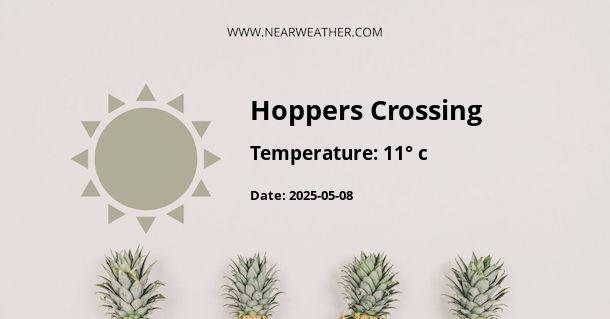Climate and Weather in Hoppers Crossing, Australia
Hoppers Crossing, a suburb of Melbourne, Australia, experiences a temperate climate with distinct seasons throughout the year. The weather is influenced by various factors, including its proximity to the coast, prevailing wind patterns, and the surrounding topography. Understanding the climate and weather patterns in Hoppers Crossing is essential for residents and visitors to prepare for the varying conditions throughout the year.
Temperature and Precipitation
Hoppers Crossing typically experiences warm summers and cool winters. The average high temperatures in the summer months, from December to February, range from 25°C to 27°C, while the winter months, from June to August, see average highs between 13°C and 15°C. The nights are generally cooler, with temperatures dropping by several degrees.
As for precipitation, Hoppers Crossing receives an average of 600 to 700 millimeters of rainfall annually. The wettest months are usually during the winter, particularly in June and July, while the summer months tend to be drier. The distribution of rainfall throughout the year plays a crucial role in shaping the local environment and affecting outdoor activities.
Seasonal Variations
Understanding the seasonal variations in Hoppers Crossing is important for planning outdoor activities and preparing for the different weather patterns.
Summer (December to February)
Summer in Hoppers Crossing brings warm temperatures and occasional hot days. The average maximum temperature ranges from 25°C to 27°C, with some days reaching into the low 30s. It is also the driest season, with minimal rainfall and extended daylight hours, providing ample opportunities for outdoor pursuits and leisure activities.
Autumn (March to May)
Autumn transitions the suburb from the warmer summer temperatures to the cooler conditions of winter. Average maximum temperatures range from 20°C to 24°C, gradually decreasing as the season progresses. The weather remains relatively mild, and the changing foliage creates picturesque landscapes across the area.
Winter (June to August)
Winter in Hoppers Crossing brings cooler temperatures, with average maximums ranging from 13°C to 15°C. While the temperatures are lower, it is also the wettest season, with increased rainfall and occasional frosty mornings. It is essential to prepare for the cooler conditions by layering clothing and taking necessary precautions for outdoor activities.
Spring (September to November)
Spring marks the transition from winter to summer, with temperatures gradually warming up. The average maximum temperatures range from 17°C to 21°C, providing pleasant weather for outdoor activities. The season also sees an increase in daylight hours and blooming flora, making it an ideal time to explore the natural beauty of the area.
Extreme Weather Events
While Hoppers Crossing generally experiences mild and temperate weather, it is essential to be aware of potential extreme weather events. This includes heatwaves during the summer months, which can lead to high temperatures and increased fire risks, as well as occasional heavy rainfall and associated flooding during the winter season.
Conclusion
Overall, Hoppers Crossing, Australia, offers a temperate climate with distinct seasonal variations in temperature and precipitation. Residents and visitors can enjoy the benefits of each season while being mindful of the potential for extreme weather events. Understanding the climate and weather patterns is essential for making the most of outdoor activities and being prepared for the varying conditions throughout the year.
A - Hoppers Crossing's Latitude is -37.882641 & Longitude is 144.700302.
A - Weather in Hoppers Crossing is 28° today.
A - Climate Conditions in Hoppers Crossing shows moderate rain today.
A - Humidity in Hoppers Crossing is 86% today.
A - Wind speed in Hoppers Crossing is 12.31 km/h, flowing at 267° wind direction. today.
